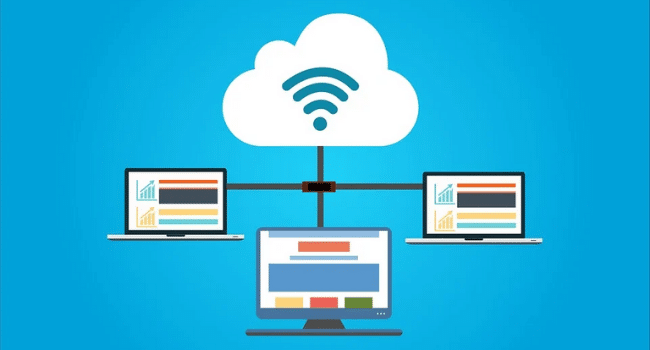Table of Contents
If you run a business and have an online presence, you might have heard IT professionals talking about “the cloud” and switching to a cloud-based model. But what exactly does that mean?
When IT pros use this term, they usually mean cloud computing, a wide-ranging expression that means computer system resources with on-demand availability. The term often references computing power and data storage. The key takeaway when someone says “the cloud,” though, is that they’re using this entity without needing to manage it directly or actively.
If you set up the cloud for your company and start using it, you get a data center available over the internet that many users can utilize. These users, presumably, would be your workers.
You can use the cloud for all kinds of things, but company owners or operators often invest in cloud services for three specific reasons. We’ll take a moment now to talk about each one of them.
Software as a Service
If you go to a cloud-based model, you might wish to do so because you want software as a service, which some IT departments abbreviate as SaaS. The idea behind this model is that you’re not paying for software like a one-time purchase, which you then own and can use at your leisure.
Instead, you’re essentially renting the software suite, usually paying the developer or proprietor a monthly fee. You might also rent it for a quarter or a year, though, if you want to save some money.
At first, it might not make a whole lot of sense to you to rent a software suite when you could buy one. However, the great thing about SaaS is that whoever owns the licensing rights to it that you’re paying to rent it will handle all of the updates for you. You will not have to fret about dealing with any of the plug-ins yourself.
They will also add any new features they create, and they will handle all the security measures. It’s like the difference between washing your car yourself or paying to run it through a carwash. If you get SaaS, you can access it through computers but also internet-enabled mobile devices.
Platform as a Service
Platform as a service is something else you might look into if you go to a cloud-based model. This is a cloud-based service where you’re paying for web portals, APIs, or gateway software.
There are many examples of this, such as AWS Elastic Beanstalk, the Google App Engine, and Salesforce’s Lightning. Many businesses want this service if they need a developer framework that they can build on and use to create customized applications having to do with the products they sell or services they offer.
With a platform as a service or PaaS, if you prefer, you have a third-party provider who will manage your networking, storage, and servers. The developer retains application management ability, but you have someone else worrying about everything else that goes along with it. You’ll be glad of that help when you take your app to live for the first time.
Infrastructure as a Service
Infrastructure as a service, or IaaS, can replace physical hardware. For instance, maybe you don’t want to have to deal with in-house web hosting servers. They take up space, and you always have to worry about something happening to them.
With IaaS, you get virtual servers or machines. You can set up many different configurations this way, depending on what it is your company does. You can have ones set up to handle a light workload or a heavy one if you have many employees all using your network at the same time.
Microsoft Azure and Amazon Web are two of the industry heavyweights if you start looking at infrastructure as a service. You often need IaaS if you’re converting a smaller company to a medium-sized or larger one. More activity usually means you’ll want to do away with bulky, cumbersome servers and take your business into the cloud.
These three services have something in common: if you go with them, you’ll get excellent data storage capabilities and better-than-average security features. This is another reason why many companies go to a cloud-based model at some point. They want to foil any potential hacker attacks, and they need to keep their proprietary information safe.
If you do go to a cloud-based option, you’ll often find that it saves you many headaches as a business owner.
Read More on KulFiy:
What is Cloud Server? Benefits of Cloud Servers for Developers.
Dedicated Server Hosting: Is it the best infrastructure for your website?
